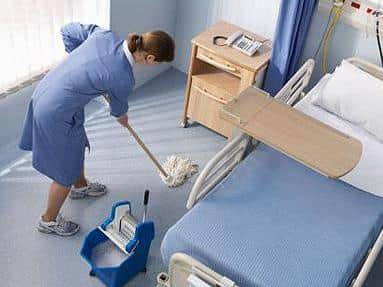More than 20,000 coronavirus crisis key workers are earning less than the real living wage in Milton Keynes
and live on Freeview channel 276
These include hospital cleaners and porters, supermarket staff and carers looking after vulnerable or elderly people.
The real living wage is a voluntary scheme devised by the Living Wage Foundation. Calculated independently from the government, it is based on costs such as food, clothing and household bills.
Advertisement
Hide AdAdvertisement
Hide AdOne in five UK employees earn below the Living Wage Foundation rate, which is currently £9.30 a hour for those working outside London.


The scheme is separate to the statutory National Living Wage, which is the legally-binding hourly rate for workers aged 25 and over. This was raised to £8.72 an hour from 1 April.
Today the GMB union is calling for key workers’ wages to be raised , saying the coronavirus crisis had shone a light on the “rock-bottom pay of the people expected to risk their health to protect us”
Economists have, however, urged against further wage rises before the full toll of the crisis is clear. The Low Pay Commission, an independent body which advises the government, warned it might be necessary to apply an "emergency brake" on long-term plans to continue to lift the statutory minimum.
Advertisement
Hide AdAdvertisement
Hide AdThe Department for Business, Energy and Industrial Strategy said: "It is right we ensure the lowest paid are fairly rewarded for their contribution to the economy, particularly those working in essential services during the biggest threat this country has faced in decades.


"This year's increase to the National Living Wage means we will be putting an extra £930 a year into the pockets of 2.4 million of the UK's lowest paid workers."
But Lola McEvoy, GMB Union organiser said: “Millions of the lowest paid in the UK have been recognised as Covid-19 key workers. This crisis has inadvertently shone a light on the rock-bottom pay and miserly terms and conditions of the people we now expect to risk their health to protect us.
“It’s simply wrong that over three million of the most vital jobs in our society pay so little that those doing them live with the compounding stress of falling behind with rent and spiralling into debt.
Advertisement
Hide AdAdvertisement
Hide Ad“All key workers including cleaners, carers, teaching assistants and hospital porters, must be respected with a real living wage and decent contractual terms that reflect their undisputable societal value.”
Nye Cominetti, Senior Economist at the Resolution Foundation think-tank said: “Britain’s low-paid workers have been at the heart of the current economic crisis, for good and bad reasons.
“Low-paying sectors like hospitality, travel and non-food retail have been most affected by the government’s lockdown, with firms closing and job losses mounting.
He added: "More positively, workers in low-paying sectors – from supermarket staff to care workers and hospital porters – are playing an essential role in steering the country through the crisis.
Advertisement
Hide AdAdvertisement
Hide Ad“Many of these workers will have benefitted from big increases in the National Living Wage, and some will have additionally benefited from wider adoption of the real living wage. For public sector workers in particular, some local authorities are already living wage accredited. Once we emerge from the crisis, other councils and public sector bodies should sign up too to show how much their lowest-paid frontline workers are valued.”